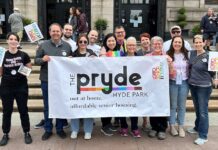
Many factors, along with being HIV positive, can contribute to what makes one more susceptible to developing complications from COVID-19. The consensus is that older people and people with chronic, immune system–suppressed health conditions (which of course can include those living with HIV) fall into the higher risk group for developing coronavirus complications that can become life-threatening.
However some cautious optimism for many HIV-positive people with healthy immune systems comes from a press release from Gay Men’s Health Crisis.
“It’s all based on level of immune suppression,” Dr. Steve Pergam of the Vaccine and Infectious Disease Division at the Fred Hutchinson Cancer Research Center in Seattle said in a written statement provided to Gay City News by Gay Men’s Health Crisis (GMHC).
“For an HIV patient who is on stable antiretroviral therapy and has a normal CD4 count, their risk may be slightly increased. People often lump HIV patients with other immunosuppressed patients, but HIV is a different disease than it was years ago. For people who have a reconstituted immune system because of treatment, I think the risk is not going to be tremendously different” than for those who are HIV-negative,” Pergam said.
GCN goes on to report:
Some doctors are acknowledging the limits of their knowledge in the face of the sudden emergence of the coronavirus, which has left them with little time or data to study its impact on different populations. Dr. Sima Toussi, a pediatric infectious disease specialist who serves as the medical director at Amida Care, told Gay City News in a phone interview March 9 that the virus’ impact on individuals living with HIV is not definitive, though she echoed some of the same points conveyed by Pergam.
“People who are not [virally] suppressed might be higher risk for getting sick,” she said.
And although older folks are more vulnerable to getting sick, that risk depends on just how old they are. The fatality rate for individuals between the ages of 70 and 79 is eight percent, according to Toussi, but that number shoots up to 14 percent for individuals between ages 80 and 89.
According to the federal Centers for Disease Control and Prevention, nearly half — 47 percent — of Americans living with HIV were above the age of 50 by 2015, and 16 percent of those folks were 65 years of age or older.
“The prevailing guidance indicates that older people, those with other health conditions, and people with compromised immune systems have a higher probability of severe illness,” GMHC CEO Kelsey Louie said in a written statement. “This includes people living with HIV, particularly those with low CD4 counts.”
A great source for HIV positive people—and everyone—looking for the latest on COVID-19 can be found on the Boston-based Fenway Health’s COVID-19/Coronavirus Information web page.
Not a subscriber? Sign up today for a free subscription to Boston Spirit magazine, New England’s premier LGBT magazine. We will send you a copy of Boston Spirit 6 times per year and we never sell/rent our subscriber information. Click HERE to sign up!









